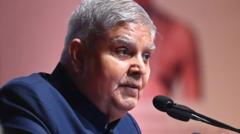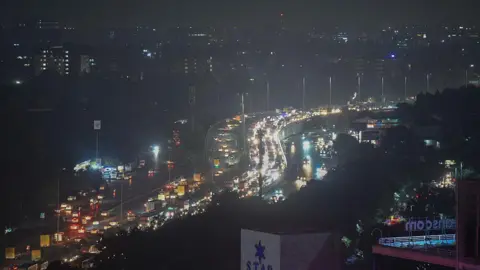The unexpected resignation of India's Vice President, Jagdeep Dhankhar, on Monday evening has ignited a flurry of speculation regarding the motivations behind his decision. Previously expected to serve until 2027, Dhankhar, who also holds the role of chairman of the Rajya Sabha, stepped down on the opening day of the parliamentary monsoon session, citing health issues as the primary reason.
While the ruling Bharatiya Janata Party (BJP), responsible for his nomination, remains silent on the matter, opposition leaders have expressed shock and concern. One member of Parliament suggested that the circumstances surrounding Dhankhar's resignation might imply ulterior motives, claiming that there is "more to it than meets the eye."
Taking office in August 2022, Dhankhar presided over sessions of the Rajya Sabha and was responsible for significant duties, including the swearing-in of newly elected members and receiving an impeachment notice against high court judge Yashwant Varma. Justice Varma has denied any wrongdoing following the discovery of cash at his residence earlier this year.
Although Dhankhar had planned to visit Jaipur on Wednesday for official duties, he abruptly submitted his resignation letter to President Droupadi Murmu on Monday night. In this letter, he expressed gratitude for his time in office, noting that witnessing India's economic growth and development has been a remarkable privilege. However, he emphasized the need to place his health as a priority and abide by medical advice.
Political circles are buzzing with intrigue about the timing of Dhankhar's resignation, especially as he had engaged with colleagues mere hours before the announcement. Anand Dubey, spokesperson for the Shiv Sena (UBT) party, expressed bewilderment, questioning the decision-making process within the government.
Reacting to the sudden departure, Manish Tewari, a member of the principal opposition Congress party, deemed the move "totally unexpected," echoing sentiments that his resignation raises more questions than answers. Likewise, Jairam Ramesh of Congress labeled it "unprecedented," mentioning a lack of communication regarding the absence of two ministers from an advisory meeting he presided over shortly before resigning.
Before stepping into the vice presidency, Dhankhar had an extensive political career, starting as an MP in 1989 and later serving as the governor of West Bengal, where he frequently clashed with the state government. Despite having undergone heart surgery earlier in the year, he remained active in his duties until his resignation.
With Dhankhar's departure from the vice presidency creating an unexpected vacancy, responsibilities may now fall to the deputy chairperson of the Rajya Sabha or another official appointed by the president. The evolving political landscape remains uncertain as stakeholders respond to this surprising development.





















